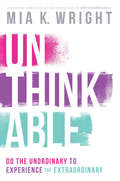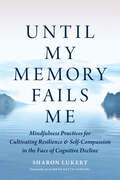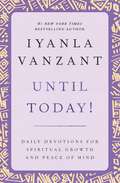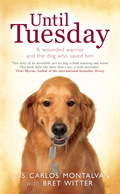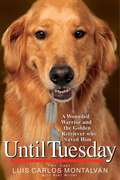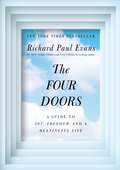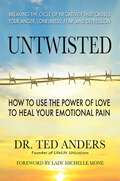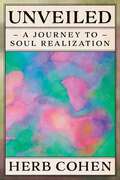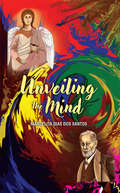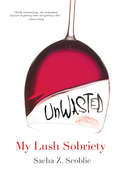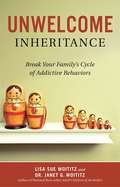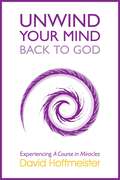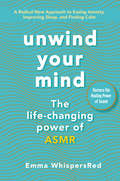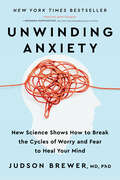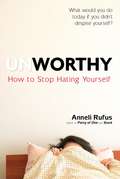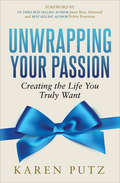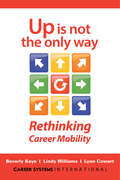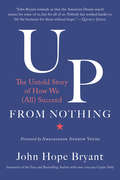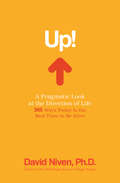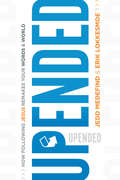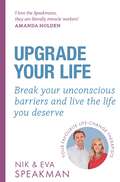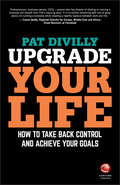- Table View
- List View
Unthinkable: Do the Unordinary to Experience the Extraordinary
by Mia K. WrightMary should have been in the kitchen with Martha, but she sat at the feet of Jesus. When Naomi commanded her daughters-in-law to go back home, Ruth vowed to stay with her and thus played a central role in God&’s plan to bring Jesus into the world. These stories inspired Mia K. Wright to overcome her personal odds and establish a new paradigm for her life. Studying the Bible, she recognized a pattern; the people who experienced the extraordinary did unordinary things. They pushed past the limitations and rules placed upon them by society, culture, and themselves. Wright challenges you to break out of the mold and join hands with the One whose dreams are bigger than you think.DON'T SETTLE FOR THE STATUS QUO. GOD WANTS TO DO SO MUCH MORE WITH YOUR LIFE. Unthinkable shows what happens when you get out of your comfort zone and trust in God alone.
Until My Memory Fails Me: Mindfulness Practices for Cultivating Resilience and Self-Compassion in the Face of Cognitive Decline
by Sharon LukertA definitive guide for navigating cognitive decline using mindfulness and meditation practices that includes practical advice and poignant stories from a Buddhist chaplain diagnosed with Mild Cognitive Impairment.When Buddhist chaplain Sharon Lukert was diagnosed with Mild Cognitive Impairment (MCI), she turned to spiritual practice and community to help her adjust to a new and ever-shifting reality. In Until My Memory Fails Me, she shares her hard-won wisdom as a guide for anyone standing at the gateway of cognitive decline.Through poignant storytelling and practical wisdom, Lukert offers specific ways to build resilience against the emotional swings and existential fear inherent in cognitive decline. The book includes:Instructions for more than a dozen mindfulness and meditation exercises, including The Handshake, Just Like Me, Open Awareness Meditation, and Tonglen (Lovingkindness) MeditationPractical advice on topics like understanding your diagnosis, how to talk to your medical providers, testing, dealing with bias, how to maintain communication, and managing new symptomsStories, advice, and encouragement from her peers in the MCI community and her &“dementia ancestors,&” those she worked with in her decades as a Buddhist chaplain in healthcare settingsWith raw vulnerability, Lukert demonstrates how to find courage, acceptance, and compassion even as your sense of self shifts underneath you.The first mindfulness book written specifically for people with MCI, the practices and lessons Lukert shares are also valuable for anyone experiencing cognitive decline caused by other disorders, as well as for loved ones and caregivers.
Until Today!: Daily Devotions for Spiritual Growth and Peace of
by Iyanla VanzantIf there are situations, circumstances, or perhaps relationships in your life that you have been struggling to overcome, trying to work through, or doing your best to work around, throw your head back and declare to the universe, "Until Today!"Whatever has been going on in your mind, your life, or your heart can stop -- right now, if that is truly what you desire. However, you must be willing to "do a new thing." You must spend a little time, each day, in devotion to the truth about yourself and your life. You must make a conscious approach to what you think, what you feel, and what you do. Devotion will clear up misconceptions that may have obscured your vision until today!Bestselling author Iyanla Vanzant presents a new book of devotions for anyone on the path to spiritual empowerment. These daily devotions will create powerful changes in the circumstances of your life that have held you back and will place you on the road to personal strength and peace of mind.
Until Tuesday: A Wounded Warrior And The Golden Retriever Who Saved Him
by Bret Witter Luis Carlos MontalvánUNTIL TUESDAY is the story of how Tuesday, a service dog, helps to heal a shattered soldier. Luis Carlos Montalván is a 17-year veteran and retired captain of the US Army. Even after suffering stab wounds, a traumatic brain injury and three broken vertebrae, Captain Luis chose to remain at his post on the Iraq-Syria border. In his mind, he had come this far, now wasn't the time to abandon his comrades. However, when Luis returned home, the pressures and injuries proved too much to bear. Physical disabilities, agoraphobia and crippling PTSD drove him to the brink of suicide. And that's when he met Tuesday. UNTIL TUESDAY entwines Luis' story of courage and bravery with that of his trusted dog, Tuesday, and shows how a brave soldier who fought tirelessly for his country, found a way back from the devastation of being injured in action, with the help of his canine friend.
Until Tuesday: A Wounded Warrior and the Golden Retriever Who Saved Him
by Luis Carlos MontalvanA heartwarming dog story like no other: Tuesday, a lovable golden retriever, changes a former soldier's life forever.A highly decorated captain in the U.S. Army, Luis Montalván never backed down from a challenge during his two tours of duty in Iraq. After returning home from combat, however, his physical wounds and crippling post-traumatic stress disorder began to take their toll. He wondered if he would ever recover.Then Luis met Tuesday, a sensitive golden retriever trained to assist the disabled. Tuesday had lived among prisoners and at a home for troubled boys, and he found it difficult to trust in or connect with a human being--until Luis.Until Tuesday is the story of how two wounded warriors, who had given so much and suffered the consequences, found salvation in each other. It is a story about war and peace, injury and recovery, psychological wounds and spiritual restoration. But more than that, it is a story about the love between a man and dog, and how, together, they healed each other's souls.ys, blessing many lives; he could turn on lights, open doors, and sense the onset of anxiety and flashbacks. But because of a unique training situation and sensitive nature, he found it difficult to trust in or connect with a human being--until Luis. Until Tuesday is the story of how two wounded warriors, who had given so much and suffered the consequences, found salvation in each other. It is a story about war and peace, injury and recovery, psychological wounds and spiritual restoration. But more than that, it is a story about the love between a man and dog, and how together they healed each other's souls.
Untitled Christmas Novel
by Richard Paul EvansFrom Richard Paul Evans, the author of the #1 New York Times bestseller The Christmas Box, "the most popular holiday tale since Tiny Tim" (Newsweek), a new holiday novel that sets a classic Christmas story in our time.Richard Paul Evans is the master of the holiday novel. As an integral part of the celebratory season, he has warmed millions of hearts with books including A Winter Dream, Lost December, and Promise Me. This new story of hope, faith, and love is the perfect gift of inspiration and is sure to be an instant Christmas classic.
Untold: A story of love, motherhood, heartbreak and change
by Snezana WoodSnezana Wood might look like she has it all - a loving husband and four children, a degree in molecular genetics and one of the biggest influencer profiles in Australia, but she's had her share of tough times. In this frank, inspiring memoir, Snezana reveals the good and the bad in her life and how she has learnt to embrace it all.Before she went on The Bachelor and met her now husband, Sam Wood, Snezana was a kid who helped her parents every day after school in their second jobs as cleaners. She was a young woman who was told she couldn't pursue the career she wanted - to join the police force - because that wasn't a job for 'someone like her'. Then she was a single mother living with her parents so they could help her look after her daughter, Eve, while she worked full time and studied at university.And while Snezana has become one of Australia's most popular influencers, her life isn't all glamour and Instagram photoshoots. After having two daughters, Willow and Charlie, with Sam, she was pregnant with her third when everything went terribly wrong. As soon as daughter Harper was born Snezana was urgently transferred to another hospital, seriously ill, her life in the balance. But she fought to get back to her family and made it through.What makes Snezana beloved by so many Australians is that she is approachable and warm, but she doesn't sugar-coat the tough stuff. She makes the best of every day and in Embrace, she inspires us all to do the same.
Untwisted: How to Use the Power of Love to Heal Your Emotional Pain
by Dr. Ted AndersIt&’s no secret that life can be hard. The emotional pain that comes with being human is often met with sadness, depression, loneliness, anger, or even rage. These reactions lead to more pain, and so a cycle of negativity is created. These days there is no shortage of pharmaceuticals being recommended to alleviate this type of suffering, but most of these drugs have potential side effects that could be worse than the problems themselves. And what's more, they address only the symptoms of emotional pain, not the pain itself. Untwisted offers a different perspective on the subject and presents a unique step-by-step approach to breaking this cycle for good.Most of us go about our days under the delusion that happiness and fulfillment are feelings we need to search for in the outside world. This is twisted thinking. This bookreveals that these concepts are not found beyond ourselves but rather lie within, and that we may achieve them by remembering a truth that has been with each and every one of us all along. Untwistedwill guide you back to this truth and, in doing so, heal your emotional pain and bring you back to joy, your natural state.Untwisted proposes a proven drug-free technique you can use to eliminate the root cause of your emotional wounds and transform your life for the better. By following the simple but powerful practices described in this book, you may begin to untangle yourself from the sadness, loneliness, depression, and anger that have had you feeling tied up for so long.
Unveiled: A Journey to Soul Realization
by Herb Cohen"Your story is as meaningful and important as anyone else's, and now you are on a journey to realize that reality and truth."Have you struggled with letting go of past trauma or understanding why certain things have happened in your life? Have you ever considered a spiritual approach to healing? Or have you never even considered the existence of a soul? In Unveiled, licensed Creative Arts Therapist Herb Cohen challenges and guides our discernment about connecting to our soul and using that connection to better grasp the events of our lives. With almost forty years of experience working with mental health, addiction, and trauma, Herb pondered the questions he repeatedly asked his clients and condensed years of informed practice into a concise approach to his process. In this book, you will contemplate: How separateness impacts our world What role "awareness" plays in our lives Why we see the world through certain lenses How to connect to your soul and be guided by the essence of who you are How to surrender to self-heal The goal of this book is to take you on a spiritual journey from trauma or atrocity to one of love and bliss.
Unveiling the Mind
by Manoelita Dias dos SantosThis book was written with the intention of elucidating points still controversial regarding the nature of human consciousness. We use elements of psychoanalysis as well as a basis of physics and various spiritual currents to construct a comprehensive view of consciousness. A human consciousness is a special physical phenomenon of the universe, a complex mechanism whose laws are intrinsically linked to subjectivity. It is undoubtedly an instigating vision of human nature.
Unwasted: My Lush Sobriety
by Sacha Z. Scoblic&“Triumphant, moving, and wildly entertaining. This is an unabashed and completely relatable account of getting clean and getting a life.&”—Steve Geng, author of Thick as ThievesThe single glass of wine with dinner . . . the cold beer on a hot day . . . the champagne flute raised in a toast . . . what I&’d drink if Hunter S. Thompson wanted to get wasted with me . . . these are my fantasies lately. Too bad I've gone sober. When Sacha Z. Scoblic was drinking, she was a rock star; the days were rough and the nights filled with laughter and blackouts. Then she gave it up. She had to. Here are her adventures in an utterly and maddeningly sober world—and how she discovered that nothing is as odd and fantastic as life without a drink in hand. . . &“A gripping, inspiring tale that picks up where most sobriety memoirs leave off . . . This is a story for anyone trying to enact meaningful change in their lives.&”—Emma McLaughlin and Nicola Kraus, #1 New York Times-bestselling coauthors of The Nanny Diaries &“Hilarious and heartbreaking, Unwasted is a traveler&’s guide to the perilous, wondrous land of sobriety. Scoblic&’s scorched, sweet prose is the work of a writer at the top of her form.&”—Jennifer Finney Boylan, New York Times-bestselling author of She&’s Not There &“Scoblic&’s testament to life on the wagon is pertinent and raffish, marked by considerable candor and humor. A dryly witty, spirited memoir.&”—Kirkus Reviews
Unwelcome Inheritance: Break Your Family's Cycle of Addictive Behaviors
by Dr Janet Woititz Lisa Sue WoititzParents affected by addiction can enable their children’s substance abuse and even model addictive behaviors learned from their own parents, passing the cycle on from generation to generation. Learn what you can do to help yourself, your children, and future generations break the cycle of addiction and addictive behaviors.Parents affected by addiction can enable their children’s substance abuse and even model addictive behaviors learned from their own parents, passing the cycle on from generation to generation. Learn what you can do to help yourself, your children, and future generations break the cycle of addiction and addictive behaviors.Having grown up with a parent in the throes of addiction, or who got physically sober but perhaps not emotionally so, you know the ravages of addiction firsthand. Through counseling, self-help groups, or classic books such as Adult Children of Alcoholics, you may have an understanding of how the patterns and behaviors associated with addiction play out within families, but applying that knowledge to your own approach to relationships and parenting is another story.In Unwelcome Inheritance, Lisa Sue Woititz combines her own insights with the unpublished contributions of her late mother, the early leader in the Adult Children of Alcoholics (ACOA) movement, Dr. Janet Woititz, uncovering how multiple generations of people affected by addiction continue to enable their children’s substance abuse and how, without realizing it, they continue to model the addictive behaviors learned from their own parents. These ACOA pioneers then bring to light these hidden behavior patterns—including impulsivity, misplaced loyalty, people pleasing, insecure parenting styles, and multiple compulsive and addictive behaviors—so that you can take a clear look at how you got to this point. Additional points of inquiry, illustrated by stories from the trenches of the ACOA movement, help you explore what you can (and can’t) do to help your children, your children’s children, and yourself lead healthy, balanced lives.
Unwind Your Mind - Back to God
by David HoffmeisterDavid Hoffmeister is a modern-day mystic who has been invited to over 30 countries and 49 states to shine and share his consistently peaceful state of mind, radiant joy and dedication to Truth. This book is a compilation of his teachings, collected from email messages, website postings, and interviews. It also includes transcripts of in-depth dialogues from the earliest days of his work with those who came from around the world to join with him. The book consists of three volumes: Book One—Laying the Foundation, Book Two—Unlearning the World, and Book Three—Transfer of Training. David&’s journey involved the study of many pathways culminating in a deeply committed practical application of A Course in Miracles. His astonishing gift for applying the metaphysics of the Course to everyday issues and concerns brings the deep ideas of the Course to life. The essays and conversations in this book work like an elixir that has the power to literally unwind the willing mind back home to God. Get ready to have your world rocked and turned upside down!David Hoffmeister&’s life is a living demonstration of the mind awakened. Your life will never be the same after joining David and his students in going deep into the unwinding of everything you think you think and everything you think you know—opening the way to the experience of who and what you truly are. The mind may be boggled by this book's uncompromising approach, but the Heart will soar in recognition
Unwind Your Mind: The Life-changing Power Of Asmr (Emma Whispersred Asmr Ser.)
by Emma WhispersRedEase Anxiety, Improve Sleep, and Find Calm Through ASMRJoin the millions experiencing the soothing power of ASMR (Autonomous Sensory Meridian Response), a radical new wellness trend for relaxation and stress-relief with proven benefits similar to meditation. In Unwind Your Mind, beloved ASMRtist Emma WhispersRed explores how this powerful practice can help us find calm and be present anytime and anywhere.Unwind Your Mind blends exercises to help you experience calm through ASMR every day. In her trademark therapeutic, soothing style, Emma WhispersRed helps us incorporate ASMR into our daily lives, revolutionizing our approach to self-care, mindfulness, and healing. Complete with a foreword from the psychologist who led one of the largest studies on ASMR, this essential guide to ASMR offers both the latest research on this growing phenomenon and the practical tools for fighting anxiety and finding calm in our lives.Unwind Your Mind is supplemented by three companion audio originals—the first of their kind widely available—ASMR for Your Commute, ASMR for Your Lunch Break, and ASMR for Bedtime.
Unwinding Anxiety: New Science Shows How to Break the Cycles of Worry and Fear to Heal Your Mind
by Judson BrewerA step-by-step plan clinically proven to break the cycle of worry and fear that drives anxiety and addictive habitsWe are living through one of the most anxious periods any of us can remember. Whether facing issues as public as a pandemic or as personal as having kids at home and fighting the urge to reach for the wine bottle every night, we are feeling overwhelmed and out of control. But in this timely book, Judson Brewer explains how to uproot anxiety at its source using brain-based techniques and small hacks accessible to anyone. We think of anxiety as everything from mild unease to full-blown panic. But it's also what drives the addictive behaviors and bad habits we use to cope (e.g. stress eating, procrastination, doom scrolling and social media). Plus, anxiety lives in a part of the brain that resists rational thought. So we get stuck in anxiety habit loops that we can't think our way out of or use willpower to overcome. Dr. Brewer teaches us map our brains to discover our triggers, defuse them with the simple but powerful practice of curiosity, and to train our brains using mindfulness and other practices that his lab has proven can work.Distilling more than 20 years of research and hands-on work with thousands of patients, including Olympic athletes and coaches, and leaders in government and business, Dr. Brewer has created a clear, solution-oriented program that anyone can use to feel better - no matter how anxious they feel.
Unworthy: How to Stop Hating Yourself
by Anneli Rufus"Self-loathing is a dark land studded with booby-traps. Fumbling through its dark underbrush, we cannot see what our trouble actually is: that we are mistaken about ourselves. That we were told lies long ago which we, in love and loyalty and fear, believed. Will we believe ourselves to death?" --from Unworthy As someone who has struggled with low self-esteem her entire life, Anneli Rufus knows only too well how the world looks through the eyes of those who are not comfortable in their own skin. In Unworthy, Rufus boldly explores how a lack of faith in ourselves can turn us into our own worst enemies. Drawing on extensive research, enlightening interviews, and her own poignant experiences, Rufus considers the question: What personal, societal, biological, and historical factors coalesced to spark this secret epidemic, and what can be done to put a stop to it? She reveals the underlying sources of low self-esteem and leads us through strategies for positive change.
Unwrapping Your Passion: Creating the Life You Truly Want
by Karen PutzThe motivational speaker and barefoot water skier shares stories of people—including herself—who found the courage to follow their passions. For years Karen Putz worked a sales job she neither loved nor hated. She liked the company and her boss, yet something essential was missing: passion. So she set out to learn from people who were madly in love with their work and their lives. Here, Karen tells the inspiring stories of individuals who discovered their true passion, purpose, and desire. And she begins with her own story of going deaf from a barefoot water-skiing accident only to rediscover her passion for the sport at age forty-four. Everyone is given a unique gift in life—but too many of us never unwrap the package. Unwrapping Your Passion is your guide to shaking up the status quo and getting down to the essence of who you are, what you love, and the passion that will drive your life forward.
Up Is Not the Only Way: Rethinking Career Mobility
by Beverly Kaye Lindy Williams Lynn CowartUp Was Never for Everyone!Move up or move out. When those two options appear to be the only ones, dissatisfaction grows and engagement suffers. In decades of studying careers around the globe, Beverly Kaye, Lindy Williams, and Lynn Cowart have found that, in fact, there are more options. And rethinking career mobility can lead you to them! The authors show how managers, coaches, and employees can partner to determine what's best and what's next. Keep the same job but discover new ways to learn and grow? Explore moving to a position that could be a better fit? Step back without getting derailed? This book encourages readers to take a "kaleidoscope" view—to be open to ever-shifting patterns of opportunities and possibilities—so they can create a unique, personalized path to a truly rewarding career.
Up The Organization
by Robert TownsendA how-to manual on survival and success in the corporate world.
Up from Nothing: The Untold Story of How We (All) Succeed
by John Hope BryantAmerican opportunity is not dead. Bestselling author and entrepreneur John Hope Bryant outlines the mindset and practices that will allow us to achieve the American Dream, no matter what our current circumstances are.Americans have lost faith in their country. With job security disappearing and fewer glimpses of a better future, it can feel like we are barely surviving, much less thriving, in today's problematic economy. Americans want the "old" America back-- the America where opportunity comes knocking at the front door. But the real problem, John Hope Bryant says, is that we're forgetting that this is still the Land of Opportunity--a site of upward mobility, a place teeming with different ways to create and grow wealth. The opportunities of today are not only greater than the obstacles, but they are greater than they have ever been. What we need, he says, is a mindset shift--a way of recalibrating to recognize that there is still a bounty of resources for establishing entrepreneurship and success in this country. The first step for us, for America, is to remember our storyline--how, coming up from nothing, we established and harnessed the invincible American Dream.
Up!: A Pragmatic Look At The Direction Of Life: 365 Ways Today Is The Best Time To Be Alive
by David NivenInsufficient healthcare coverage, a weakened economy, the fragile environment—most people would be hard pressed to find even one example of how things are better today than they were yesterday. How about one for each day of the year? In his engaging and informative new book, Up!, David Niven, the best-selling author of the 100 Simple Secrets series (more than a million copies sold in the U.S. alone), gives us 365 examples of how life is better now than ever before. We think we’re running out of time—but we actually live twice as long as our great-grandparents did. We think our culture is in decline—but worldwide IQ scores are higher today than ever before. We think life keeps getting harder—but the percentage of people who feel happy is growing every year. Well researched and full of insight, Up! not only proves that life today is a vast improvement from the past but also that it continues to get better with each passing day. For those who need convincing or for those who need reminding, Up! is a great resource for appreciating how far we’ve come and realizing that, in all ways, things are truly looking Up!
Upended: How Following Jesus Remakes Your Words and World
by Jedd Medefind Erik LokkesmoeConnect... Influence… Love… In a way that overturns the world's assumptions. Upended invites the follower of Jesus to become an apprentice to Jesus, particularly in the choices that shape our lives most: how we communicate and connect. Join this exhilarating exploration of the often overlooked, often oversimplified character of Jesus and His unparalleled way of communicating. Study, echo, and embrace the ways of the Master. Your life will inevitably be upended. Not always how you’d imagined, but certainly for the better. Much better.
Upgrade Your Life: Break your unconscious barriers and live the life you deserve
by Nik Speakman Eva SpeakmanIt's time for an upgradeWe upgrade our technology all the time, but what about ourselves? If you feel held back and frustrated, if you feel like you need to change but you don't know how - then Nik and Eva Speakman want you to upgrade your life.Using the techniques and exercises that they have used to transform the lives of countless clients, Nik and Eva give you the skills and confidence to change the voice in your head from one that says 'I can't' to one that says 'I can.'In Upgrade Your Life you will learn that anything is possible when you push past your unconscious barriers and take action towards your dreams.The new you is closer than you think.
Upgrade Your Life: Break your unconscious barriers and live the life you deserve
by Nik Speakman Eva Speakman'I've seen their work first hand when it came to my own fear of flying - they are a great team' HOLLY WILLOUGHBYThe Speakmans' powerful and life-changing guide to conquering anxiety and living a more positive life.The world's leading life-change therapists, the Speakmans, share a passion to help people lead happier and less inhibited lives. Their intellectual curiosity guided them through years of extensive research into behaviourism and conditioning, which led to the creation of their groundbreaking behavioural change therapy known as 'Schema Conditioning'.Based on the Speakmans' unique coaching method this book provides the key to eliminating anxiety. If you suffer from generalised anxiety, panic attacks or feel abnormally anxious about certain things, the Speakmans show you that you can overcome these conditions successfully and enjoy a healthy, carefree life.
Upgrade Your Life: How to Take Back Control and Achieve Your Goals
by Pat DivillyStep away from boredom and reclaim your life Feeling unfulfilled? Do you dream of a lifestyle where you can have it all - good health, wealth, freedom and happiness? You're not alone. Upgrade Your Life is your guide to taking the power back and becoming the master of your own fate and that of your business. Author Pat Divilly has worked with an array of small business owners to help them achieve a growing business based on purpose, passion and profit whilst also maintaining a healthy work-life balance. Pat offers a practical approach to setting and achieving personal and business goals, understanding that both are necessary in order to succeed in life. By promoting personal development and daily success rituals Upgrade Your Life inspires its readers to dream big and not give up in the search for fulfilment. Using the author's own experiences, mixed in with valuable neuroscience research and popular psychology, Upgrade Your Life will help fast-track you and your business on the road to success. Learn how to implement your own game plan of simple daily steps to achieve your goals Get tips on creating the perfect work-life balance Update your daily routine to become more productive Includes a 42-day success planner to help you stay on top of your dreams
